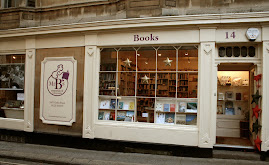
Lots of willing travelling companions
for Grahame Greene's unconventional
Aunt Augusta - so many turned up for
this one that we had to split the group
in two. So, this post will only be able
to cover half the meeting! For those of
you who were in the upstairs group,
feel free to chip in. I should also mention
that Chris provided some excellent cake,
which meant that despite us not being
prepared for such a large meeting, there
were sufficient nibbles to go round.
(Please, please, please try to remember to drop us an email/phone message in advance of the meeting to let us know you are coming!)
Now, back to the book. It was great fun to read and everyone round the table enjoyed this rather 'late in life' blossoming of Henry Pulling. There was some debate over exactly when the book is set. Aunt Augusta ranges from Edwardian courtesan to 20's flapper girl in people's minds. Henry, has the stuffiness associated with late 1940's/early 1950's English gentlemen - and yet he encounters a hippie-esque teenager out of the early 1970's. How much of this is Greene's design? After all, the reader is floundering as much as Henry is at the beginning of the book, encountering lives so far removed from his own sphere of existence.
There are some aspects of the writing style, however, which unquestionably date it as mid-2oth Century. The group noted that whilst there is a libertarian attitude exhibited by Aunt Augusta to her African 'valet', Wordsworth, he is the only character in a gamut of foreign gentlemen who Greene feels the need to voice in dialect (patois). As a result, the reader makes snap judgements about Wordsworth's intelligence, which he is never prompted to do elsewhere. On the plus side, Wordsworth is a very rounded and interesting character rather than an archetype. He has the wit to use stereotypes (himself as a coloured man and Henry as a dull, establishment figure) for his own ends - as does Aunt Augusta.
Henry's naivety underpins much of the humour of the book. How much of this is real, though? We are left wondering whether he has simply inherited his Aunt's gift for fantastical storytelling. The book is narrated retrospectively. Everything we are told has the sheen of careful reflection and detail rather than bewildering immediacy. This means that despite Henry facing some awkward circumstances, there is a feeling of assurance about each episode he recalls. It helps with the humour and light touch of the book and enables Greene to sneak in some pretty taboo areas of Aunt Augusta's life philosophy. It also helped when the suspension of credulity is required as the novel is full of coincidences (the most jarring being the chance encounter with the hippie Tooley's father).
That many of the characters are not fully fleshed out, or that their motives remain hidden, or that their actions are unbelievable, didn't cause too many problems. Aunt Augusta is a very entertaining character to spend time with: by turns outrageous, unconventional, immoral, flawed and dogmatic. As the focus of the novel, Henry's slow realisation that he has lived the wrong sort of life (staid bank manager, predictable days) is a treat and gives succour to all of us that it is never too late!
Next up is 'The Prestige' by Christopher Priest, which we will be discussing on Monday 19th September. (Lucinda)













